新概念第二册Lesson70教案
- 格式:doc
- 大小:45.50 KB
- 文档页数:3
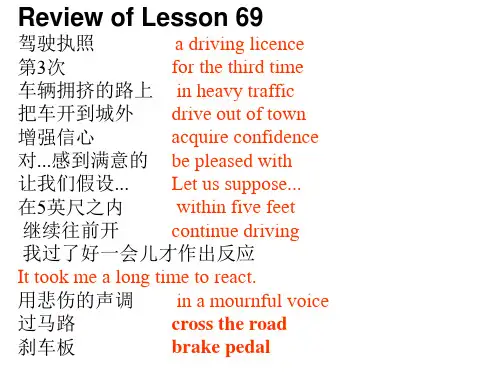
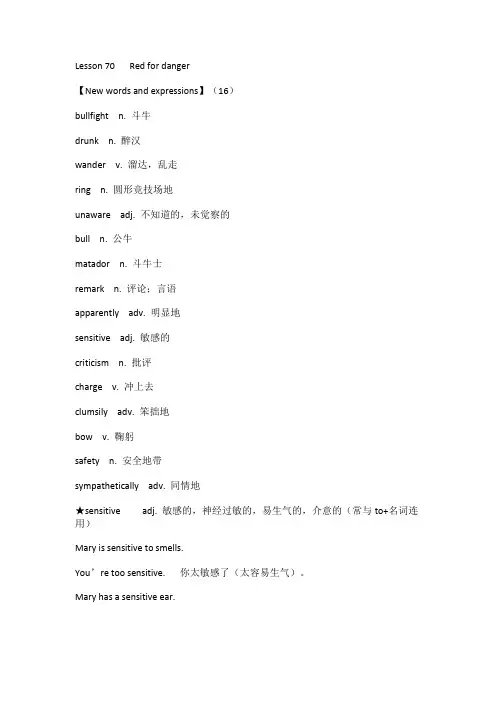
Lesson 70 Red for danger【New words and expressions】(16)bullfight n. 斗牛drunk n. 醉汉wander v. 溜达,乱走ring n. 圆形竞技场地unaware adj. 不知道的,未觉察的bull n. 公牛matador n. 斗牛士remark n. 评论;言语apparently adv. 明显地sensitive adj. 敏感的criticism n. 批评charge v. 冲上去clumsily adv. 笨拙地bow v. 鞠躬safety n. 安全地带sympathetically adv. 同情地★sensitive adj. 敏感的,神经过敏的,易生气的,介意的(常与to+名词连用)Mary is sensitive to smells.You’re too sensitive. 你太敏感了(太容易生气)。
Mary has a sensitive ear.★charge v. 冲上去①vt. &vi. 要价,收费They charged us too much for repairs.How much do you charge for this dress?②vt. 指控,指责The police charged him with murder.He charged Gary with speeding.③vt. &vt. 猛攻,冲向,冲锋,向前冲The bull charged at the drunk.★bow v. 鞠躬①vt. &vt. 鞠躬,欠身,低下(头等)The crowd broke into cheers and the drunk bowed.As she couldn’t answer the question, she bowed her head.②vi. 让步,屈服,服从Why did you bow to their decision?He finally bowed before money and married the other girl.③vt. 压弯,压倒My mother is bowed with age. 我母亲因年老而腰弯背驼。
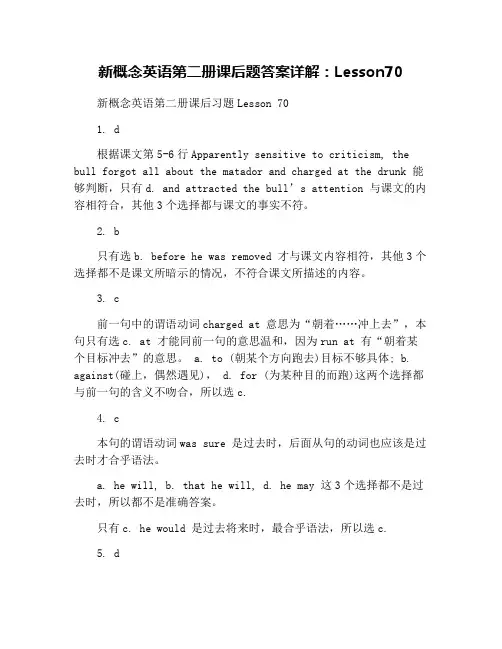
新概念英语第二册课后题答案详解:Lesson70新概念英语第二册课后习题Lesson 701. d根据课文第5-6行Apparently sensitive to criticism, the bull forgot all about the matador and charged at the drunk 能够判断,只有d. and attracted the bull’s attention 与课文的内容相符合,其他3个选择都与课文的事实不符。
2. b只有选b. before he was removed 才与课文内容相符,其他3个选择都不是课文所暗示的情况,不符合课文所描述的内容。
3. c前一句中的谓语动词charged at 意思为“朝着……冲上去”,本句只有选c. at 才能同前一句的意思温和,因为run at 有“朝着某个目标冲去”的意思。
a. to (朝某个方向跑去)目标不够具体; b. against(碰上,偶然遇见), d. for (为某种目的而跑)这两个选择都与前一句的含义不吻合,所以选c.4. c本句的谓语动词was sure 是过去时,后面从句的动词也应该是过去时才合乎语法。
a. he will,b. that he will, d. he may 这3个选择都不是过去时,所以都不是准确答案。
只有c. he would 是过去将来时,最合乎语法,所以选c.5. d本句中的 let 后面只能跟宾语加不带to 的动词不定式(let sb. do sth.)才合乎语法. a. passing, b. to pass, c. in passing 都不能用在let 后面,只有d. pass 是不带to 的动词不定式,所以应该选d.6. b该句的谓语动词是(had come)过去完成时,需要选一个相对应的时间状语. a. Up till that time 和 d. Until then 都有"到那时为止"的意思,都能够用于过去完成时,但它们都不能同时表示瞬间的动作的动词(如go, come 等)的完成时连用,故不能选a. d. ; c. So far(到当前为止)只能用于现在完成时.只有b. By then(那时,此时)能够用于过去完成时,所以b是答案.7. c本句的谓语动词looked on 是一般过去时,从句也应该是相对应的过去时态。
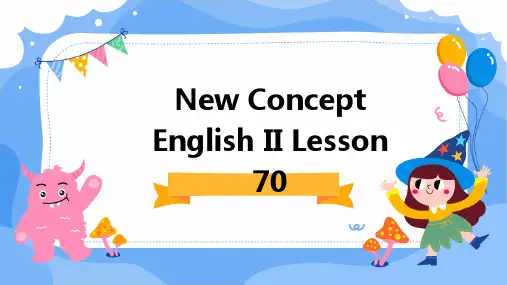
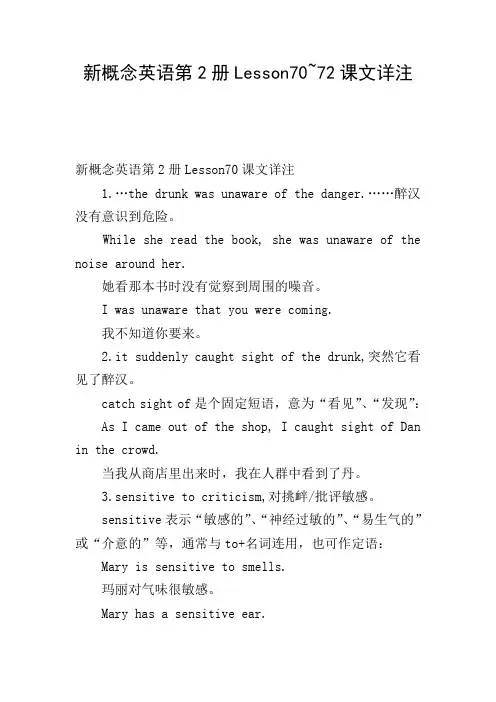
新概念英语第2册Lesson70~72课文详注新概念英语第2册Lesson70课文详注1.…the drunk was unaware of the danger.……醉汉没有意识到危险。
While she read the book, she was unaware of the noise around her.她看那本书时没有觉察到周围的噪音。
I was unaware that you were coming.我不知道你要来。
2.it suddenly caught sight of the drunk,突然它看见了醉汉。
catch sight of是个固定短语,意为“看见”、“发现”:As I came out of the shop, I caught sight of Dan in the crowd.当我从商店里出来时,我在人群中看到了丹。
3.sensitive to criticism,对挑衅/批评敏感。
sensitive表示“敏感的”、“神经过敏的”、“易生气的”或“介意的”等,通常与to+名词连用,也可作定语:Mary is sensitive to smells.玛丽对气味很敏感。
Mary has a sensitive ear.玛丽的耳朵很灵敏。
You’re too sensitive.你太敏感了(太容易生气了)。
4.The drunk, however, seemed quite sure of himself.可这醉汉像是很有把握似的。
be/ feel sure of oneself 表示“有自信心”:She’s always so sure of herself.她总是这么自信。
5.The crowd broke into cheers…观众欢呼起来……break into 的含义之一是“突然发出/做出”、“突然……起来”,有控制不住的含义:On hearing the news, she broke into tears.听到消息后,她大哭起来。
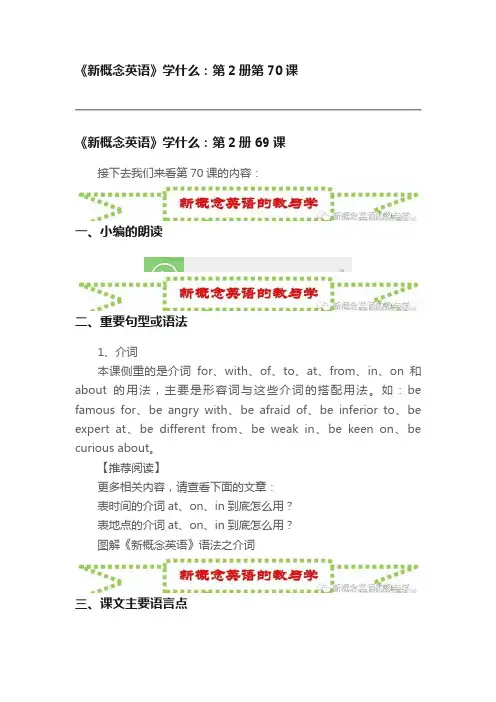
《新概念英语》学什么:第2册第70课《新概念英语》学什么:第2册69课接下去我们来看第70课的内容:一、小编的朗读二、重要句型或语法1、介词本课侧重的是介词for、with、of、to、at、from、in、on和about的用法,主要是形容词与这些介词的搭配用法。
如:be famous for、be angry with、be afraid of、be inferior to、be expert at、be different from、be weak in、be keen on、be curious about。
【推荐阅读】更多相关内容,请查看下面的文章:表时间的介词at、on、in到底怎么用?表地点的介词at、on、in到底怎么用?图解《新概念英语》语法之介词三、课文主要语言点During a bullfight, a drunk suddenly wandered into the middle of the ring. 1)bullfight ,斗牛。
注意bull 与ox 的区别:ox 一般是指阉割过的公牛,主要是肉牛或是干活的牛。
所以,一般机构或组织名不会用ox 的,这也就是为什么芝加哥公牛队叫做Chicago Bulls ,而不叫ChicagoOxen 的原因了。
2)drunk ,醉汉。
3)wander ,徘徊、溜达。
4)ring ,圆形竞技场。
The crowd began to shout, but the drunk was unaware of the danger. 1)crowd ,人群。
crowd 也可以用作表量的名词,如:a crowd ofpeople 。
2)be unaware of ,没有意识到。
unaware 源自aware (意识到的)。
3)danger ,危险。
其形容词为dangerous (危险的)。
其名词的常见短语用法为:be in danger 。
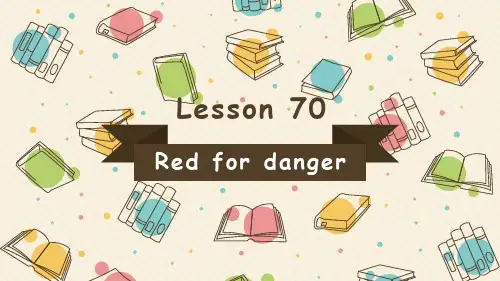
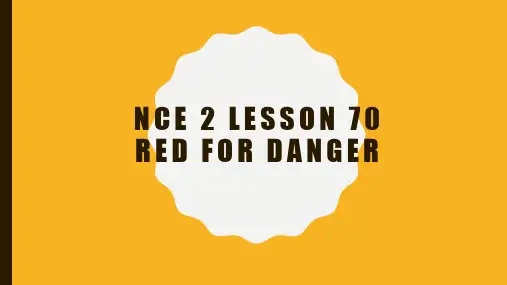
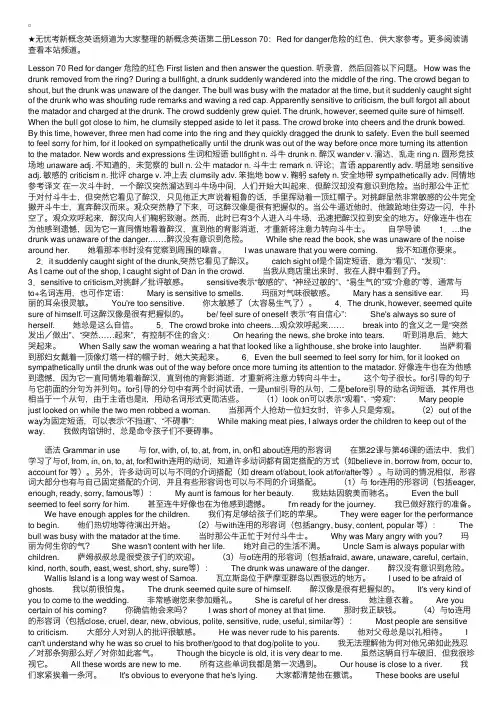
★⽆忧考新概念英语频道为⼤家整理的新概念英语第⼆册Lesson 70:Red for danger危险的红⾊,供⼤家参考。
更多阅读请查看本站频道。
Lesson 70 Red for danger 危险的红⾊ First listen and then answer the question. 听录⾳,然后回答以下问题。
How was the drunk removed from the ring? During a bullfight, a drunk suddenly wandered into the middle of the ring. The crowd began to shout, but the drunk was unaware of the danger. The bull was busy with the matador at the time, but it suddenly caught sight of the drunk who was shouting rude remarks and waving a red cap. Apparently sensitive to criticism, the bull forgot all about the matador and charged at the drunk. The crowd suddenly grew quiet. The drunk, however, seemed quite sure of himself. When the bull got close to him, he clumsily stepped aside to let it pass. The crowd broke into cheers and the drunk bowed. By this time, however, three men had come into the ring and they quickly dragged the drunk to safety. Even the bull seemed to feel sorry for him, for it looked on sympathetically until the drunk was out of the way before once more turning its attention to the matador. New words and expressions ⽣词和短语 bullfight n. ⽃⽜ drunk n. 醉汉 wander v. 溜达,乱⾛ ring n. 圆形竞技场地 unaware adj. 不知道的,未觉察的 bull n. 公⽜ matador n. ⽃⽜⼠ remark n. 评论;⾔语 apparently adv. 明显地 sensitive adj. 敏感的 criticism n. 批评 charge v. 冲上去 clumsily adv. 笨拙地 bow v. 鞠躬 safety n. 安全地带 sympathetically adv. 同情地参考译⽂在⼀次⽃⽜时,⼀个醉汉突然溜达到⽃⽜场中间,⼈们开始⼤叫起来,但醉汉却没有意识到危险。
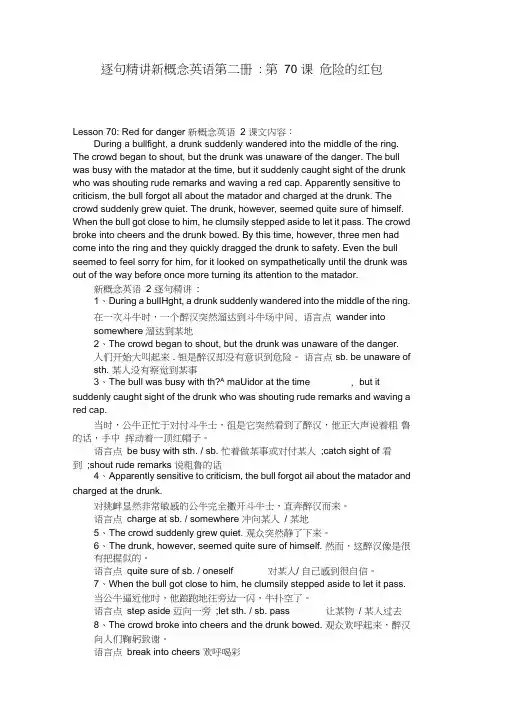
逐句精讲新概念英语第二册: 第70 课危险的红包Lesson 70: Red for danger 新概念英语2 课文内容:During a bullfight, a drunk suddenly wandered into the middle of the ring. The crowd began to shout, but the drunk was unaware of the danger. The bull was busy with the matador at the time, but it suddenly caught sight of the drunk who was shouting rude remarks and waving a red cap. Apparently sensitive to criticism, the bull forgot all about the matador and charged at the drunk. The crowd suddenly grew quiet. The drunk, however, seemed quite sure of himself. When the bull got close to him, he clumsily stepped aside to let it pass. The crowd broke into cheers and the drunk bowed. By this time, however, three men had come into the ring and they quickly dragged the drunk to safety. Even the bull seemed to feel sorry for him, for it looked on sympathetically until the drunk was out of the way before once more turning its attention to the matador.新概念英语 2 逐句精讲:1、During a bulIHght, a drunk suddenly wandered into the middle of the ring.在一次斗牛时,一个醉汉突然溜达到斗牛场中间, 语言点wander intosomewhere 溜达到某地2、The crowd began to shout, but the drunk was unaware of the danger.人们开始大叫起来. 钽是醉汉却没有意识到危险。
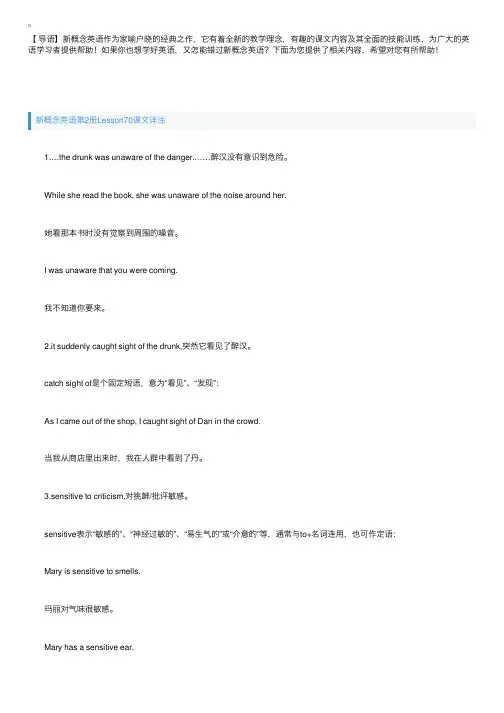
【导语】新概念英语作为家喻户晓的经典之作,它有着全新的教学理念,有趣的课⽂内容及其全⾯的技能训练,为⼴⼤的英语学习者提供帮助!如果你也想学好英语,⼜怎能错过新概念英语?下⾯为您提供了相关内容,希望对您有所帮助!新概念英语第2册Lesson70课⽂详注 1.…the drunk was unaware of the danger.……醉汉没有意识到危险。
While she read the book, she was unaware of the noise around her. 她看那本书时没有觉察到周围的噪⾳。
I was unaware that you were coming. 我不知道你要来。
2.it suddenly caught sight of the drunk,突然它看见了醉汉。
catch sight of是个固定短语,意为“看见”、“发现”: As I came out of the shop, I caught sight of Dan in the crowd. 当我从商店⾥出来时,我在⼈群中看到了丹。
3.sensitive to criticism,对挑衅/批评敏感。
sensitive表⽰“敏感的”、“神经过敏的”、“易⽣⽓的”或“介意的”等,通常与to+名词连⽤,也可作定语: Mary is sensitive to smells. 玛丽对⽓味很敏感。
Mary has a sensitive ear. 玛丽的⽿朵很灵敏。
You're too sensitive. 你太敏感了(太容易⽣⽓了)。
4.The drunk, however, seemed quite sure of himself.可这醉汉像是很有把握似的。
be/ feel sure of oneself 表⽰“有⾃信⼼”: She's always so sure of herself. 她总是这么⾃信。
Class:nce2-4 Place:whl Date:2016- - Time:Sun.4:00-6:00 Teaching type&title: new lesson 70 red for danger Teaching contents&aims: bullfight drunk wander ring unaware bull matador remark apparently sensitive criticism charge clumsily bow safety sympathetically 介词for with of to at from in on about与动词的搭配 Key points: drunk wander ring unaware remark apparently sensitive criticism charge clumsily safety sympathetically 介词for with of to at from in on about与动词的搭配 Difficulties: runk wander unaware apparently sensitive criticism charge safety 介词for with of to at from in on about与动词的搭配 Procedure: Step one review ask and answer Step two new lesson 1. Lead in: Have you drunk the redbull? It’s a kind of drink and it makes you very energetic. Bull is a kind of animal. in Rome, there are lots of bullfights. Do you think it is dangerous or not? 2. Introduce the story: A drunk walked into a ring and he didn’t know it was very dangerous. 3. Listen and answer: How was the drunk removed from the ring? 4. Words 5. Listen,imitate and learn:
★sensitive adj. 敏感的,神经过敏的,易生气的,介意的(常与to+名词连用) Mary is sensitive to smells. You’re too sensitive. Mary has a sensitive ear.
★charge v. 冲上去 ① vt. &vi. 要价,收费 They charged us too much for repairs. How much do you charge for this dress? ② vt. 指控,指责 The police charged him with murder. He charged Gary with speeding. ③ vt. &vt. 猛攻,冲向,冲锋,向前冲 The bull charged at the drunk.
★bow v. 鞠躬 ① vt. &vt. 鞠躬,欠身,低下(头等) The crowd broke into cheers and the drunk bowed. As she couldn’t answer the question, she bowed her head. ② vi. 让步,屈服,服从 Why did you bow to their decision? He finally bowed before money and married the other girl.
③ vt. 压弯,压倒 My mother is bowed with age. The little tree is bowed with snow.
【课文讲解】 1、The crowd began to shout, but the drunk was unaware of the danger. be unaware of… 不知道,没有觉察…… While she read the book, she was unaware of the noise around her. I was unaware that you were coming. 我不知道你要来。
2、The bull was busy with the matador at the time, but it suddenly caught sight of the drunk who was shouting rude remarks and waving a red cap. catch sight of… 突然看到…… As I came out of the shop, I caught sight of Dan in the crowd.
3、The drunk, however, seemed quite sure of himself. be/feel sure of oneself 有自信心 She’s always so sure of herself.
4、Apparently sensitive to criticism, the bull forgot all about the matador and charged at thedrunk. sensitive to criticism 对挑衅/批评敏感 charge at … 向……攻击 5、The crowd broke into cheers and the drunk bowed. break into cheers 突然喝起彩来 break into… 突然发出,突然……起来 On hearing the news, she broke into tears. When Sally saw the woman wearing a hat that looked like a lighthouse, she broke into laughter.
6、Even the bull seemed to feel sorry for him, for it looked on sympathetically until the drunk was out of the way before once more turning its attention to the matador. look on 旁观,观看 Many people just looked on while the two men robbed a woman. out of the way 不碍事,不挡路 While making meat pies, I always order the children to keep out of the way.
在做肉馅饼时,总是命令孩子们不要碍事。 Step three Key structures
与 for,with,of,to,at,from,in,on和 about连用的形容词
与 for 连用的形容词:eager for(渴望),enough for(足够),famous for(以……而闻名),fit for(合适),grateful for/to(因……而感激),qualified for/in(能胜任),ready for/to(准备好),responsible for(对……负责),sorry for(对……感到遗憾),sufficient for(充足
的),thankful for/to(感谢),valid for(有效期为……) We have enough apples for the children. They were eager for the performance to begin. My aunt is famous for her beauty.
与 with连用的形容词:angry with sb./at sth.(因某人或某事生气),busy with/at(忙于……),consistent with(与……一致),content with(对……满足),familiar with/to(与……熟悉),patient with(有耐心),popular with(为……所喜爱) Why was Mary angry with you? She wasn’t content with her life. Uncle Sam is always popular with children.
与of 连用的形容词:afraid of(害怕),ahead of(在……前面),aware of(知道),capable of(能够),careful of/with(小心),certain of(确信),conscious of(意识到),envious of(妒忌),fond of(爱好),guilty of(有……罪的),ignorant of(不了解),independent of
(独立于),jealous of(妒忌),kind of/to(对……和蔼),north/south/east/west of(在……的北/南/东/西面),short of(缺乏),shy of(顾虑),sure of(肯定),worthy of(值得) She is careful his coming. 她注意衣着。 I was short of money at that time.
与to连用的形容词:close to(接近于),contrary to(与……相反),cruel to(对……残忍),dearto(对……很重要),equal to(与……相等),faithful to(忠于……),fatal to(对……是致命的),harmful to(对……有害的),identical to(与……相同的),indifferent to(对……不关心),inferior to(劣于……),liable to(对……有义务的),new to(对……没有经验),obedient to(对……服从),obvious to(对……清楚的),polite to(对……有礼貌),previous to(先于),rude to(对……粗暴无礼),sensitive to(对……敏感),similar to(与……相似),useful to(对……有用) Most people are sensitive to criticism. Though the bicycle is old, it is very dear to me. 虽然这辆自行车破旧,但我很珍视它。 All these words are new to me. 所有这些单词我都是第一次遇到。 It’s obvious to everyone that he’s lying. 大家都清楚他在撒谎。 My car is similar to yours. 我的车与你的车相似。